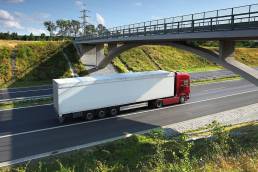Sustainability is a huge concern for industries everywhere – and customers are demanding it more than ever. This is certainly the case with transport and logistics, with research revealing that 25% of consumers would switch to a competitor if sustainable delivery options weren’t available.
And it’s not just customers that are asking for greener fleets. Employees are making similar demands, with Deloitte reporting that 69% want their companies to invest in sustainability efforts. Fortunately, that investment is likely to be rewarded, with fleet sustainability improving profitability through route optimization, driver monitoring, compliance, and more. That’s why many employers also favor reducing their fleet’s CO2 emissions. One of the most effective ways to do so is by using the right fleet management software.
The benefits of fleet management software
Fleet managers are under constant pressure. They have to satisfy customer demands, meet environmental aims, and maintain profitability. Fortunately, fleet management software can help with all this and more. Some of the benefits of fleet management software include:
- Route optimization: Real-time data collected by fleet management tools can tell drivers the quickest (or most fuel-efficient) routes. These routes can update automatically if there are road closures or unusually high levels of traffic so your vehicles are always on the best route – whatever happens.
- Driver monitoring: Carbon emissions are not only affected by the length of the route being taken. Driver behavior has an impact too. Fleet management software can monitor driver behavior, including excessive braking and unnecessary dwell time, so managers can provide tips and training on how to avoid excessive fuel consumption.
- Maintenance: Vehicle maintenance can have a major impact on emission levels, with poorly maintained cars emitting as much as 10% additional CO2. But maintenance costs money so businesses don’t want to schedule it if it’s not needed. However, fleet management software can analyze vehicle data to predict the optimal time for maintenance to be carried out.
- Analytics: The constant stream of data generated by your fleet needs to be processed and analyzed if it will lead to improvements in sustainability and profitability. The analytics features of fleet management tools can automatically generate insights and even entire reports based on the data they collect so you have insight as well as information.

The benefits of fleet management software are clear in terms of environmental and economic matters. From predictive maintenance to real-time visibility, there are several ways that these tools can be used to aid in sustainability and lowering fuel costs. That’s why leading brands like building material supplier Holcim, technology provider Rastret, and many others are employing fleet management solutions in their work.
Fleet management software challenges
Even though the advantages of fleet management software are undeniable and have to be embraced if businesses want to stand a chance of meeting increasing market and industry demands, there are still challenges around using these applications effectively.
One of these challenges concerns how you choose which fleet management tool is right for you. First, you’ll need to think carefully about what your aims are. Do you want your software to primarily reduce emissions, improve communication with drivers, or something else? Consider your strategic aims and then look for a solution that offers the features you need to achieve them. And don’t forget to check what support is offered with your chosen software.
Whichever fleet management solution you choose, it’s unlikely to be the only digital tool at your company. Make sure the program you select can integrate with the other tools that make up your IT stack. Any integration failures are likely to create organizational silos that could result in miscommunication and a poor customer experience.
Although they could reduce fuel costs and introduce other efficiencies in the long run, employee management software may involve costs too. Consider these costs carefully and, in the case of subscription plans, how they could build up over time. Are there add-ons to be paid for? Will you need to invest in employee training to get the most out of the software?
The future of fleet management
With current trends, including the adoption of AI, electric fleets, autonomous vehicles, and others, emerging fast, the importance of adopting fleet management software appears more pressing than ever.
Even considering these futuristic developments, however, two present-day concerns must be confronted: emissions and fuel costs. Fleet management can help address both of these while future-proofing your operations for the coming industry evolution. And no solution does it better than Local Eyes, supported by their first-class service and support.
For more information on how Local Eyes can reduce your fleet’s CO2 emissions – for the benefit of the planet and your profits – download our whitepaper, How to reduce your fleet CO2 emission and your fuel costs, today.
Local Eyes B.V. is a leading reseller and integrator of geospatial technologies and data that has been contributing to its client’s success for the past 10 years by optimizing their decision-making and logistic processes. Find out how working with Local Eyes can help cut the environmental impact of transportation and logistics. Get in touch with us today.




